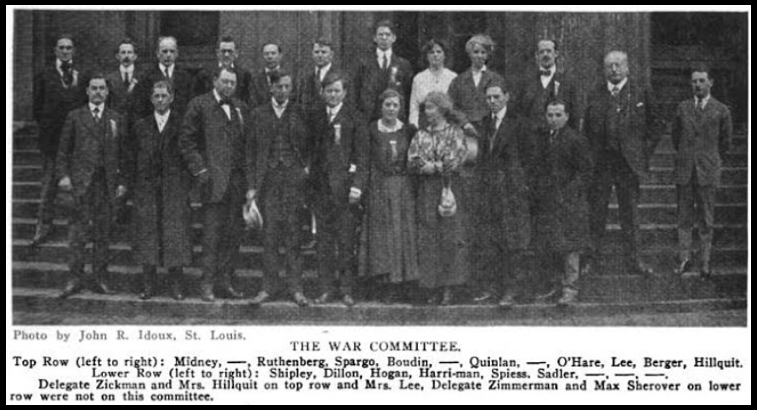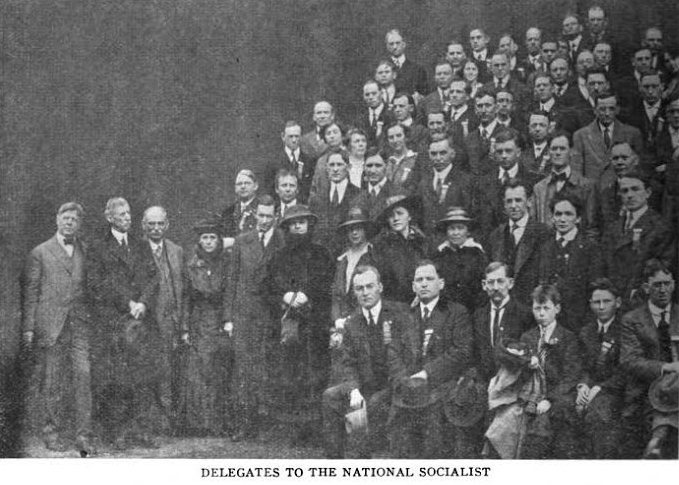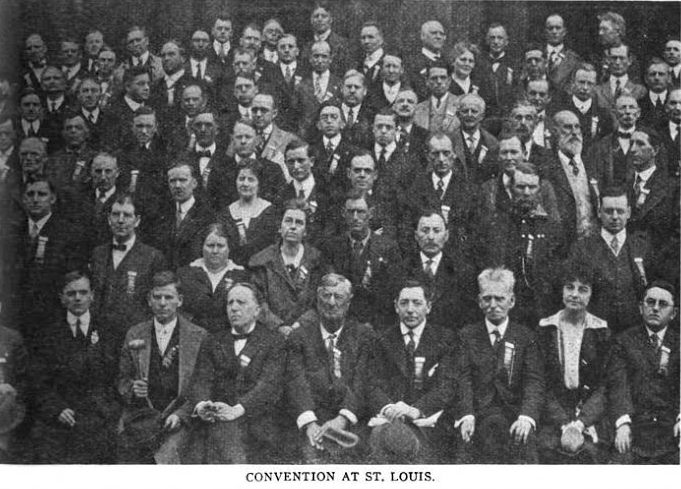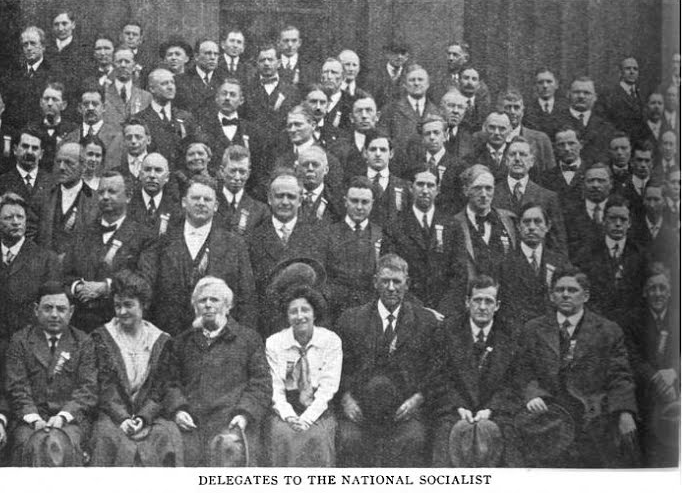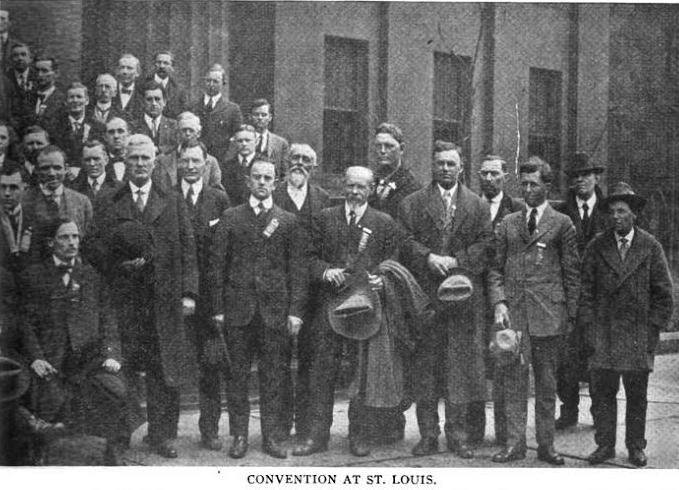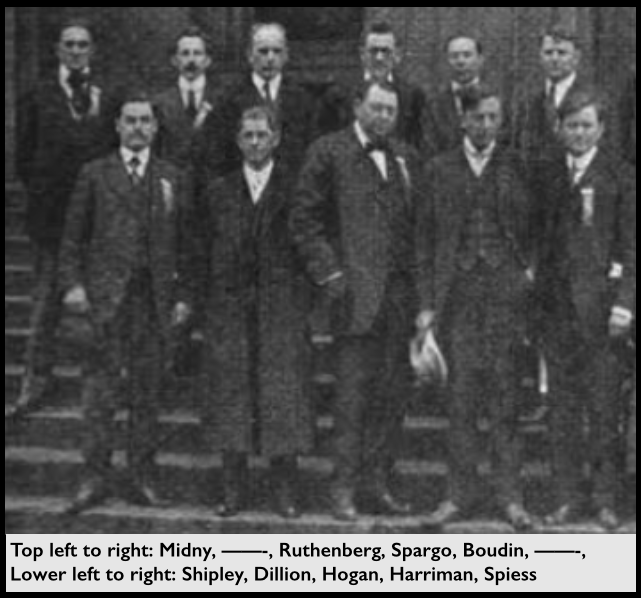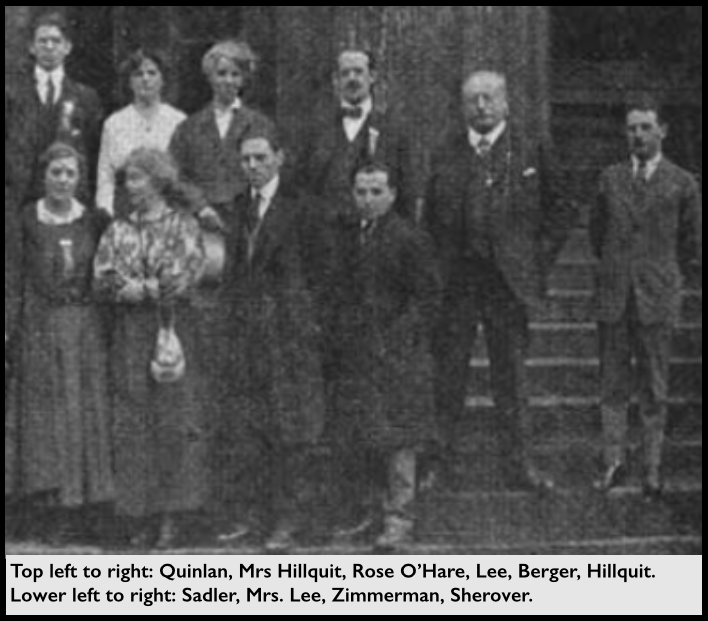I have no country to fight for;
my country is the earth;
I am a citizen of the world.
-Eugene Victor Debs
Hellraisers Journal, Friday May 4, 1917
The Socialist Party of America on War and Militarism
From April 7th to the 14th, delegates gathered in St. Louis, Missouri, for a “National Emergency Convention” to consider the Socialist position on the “orgy of war.” A Majority Report and two Minority Reports on War and Militarism were the end result of that convention and those Reports are being put up to a vote of the membership this month.
From this month’s International Socialist Review:
The Emergency National Convention
By LESLIE MARCY
IN compliance with a mandate hurriedly issued by the National Executive Committee, delegates assembled at the Planters Hotel in St. Louis on Saturday morning, April 7th. All states were represented with the exception of Alabama, Alaska, Mississippi, North Carolina and South Carolina, while Texas was represented part of the time by one delegate.
This convention was called without a referendum vote and in face of the fact that there was very little demand on the part of the membership for it. The Constitution nowhere empowers the National Executive Committee to call a special convention. In many states the membership was not even given an opportunity to elect delegates but the rank and file will be asked to dig up $15,000.00 to cover the cost of the convention. The excuse for the convention was to find out how the party stood on the question of war. All the National Executive Committee had to do was to say, Let there be a convention, and there was a convention.
As many theories were represented regarding war, its cause and cure and the attitude the party should take in the present crisis, as there were tongues around the Tower of Babel. Many of the delegates came uninstructed but there were half a dozen delegations which came instructed to vote against all wars, offensive or defensive. The delegates from Illinois, Michigan, Washington and Ohio were cleancut and uncompromising and voted solidly together for a clear, concise statement of the party’s position.
The convention was called to order by Comrade Germer and Morris Hillquit, as temporary chairman, made the opening address, which was generously applauded. We quote two or three interesting statements from the New York Call:
We, the Socialist party of the United States, are today the only permanently organized force that has still retained a clear vision, an unclouded mind, in this general din of confusion, passion and unreason, and it devolves upon us to continue our opposition to this criminal war even now, after it has been declared. (Applause and cries of “Good!”)
* * *
This war will be ended, not by diplomacy, not by representatives of the monarchical governments of Europe. It will be ended by the rebellious working class of Europe. (Applause.) And when the hour comes, Comrades, when the proletariat of the world finds itself, when it resumes its struggle for liberty and for social justice, let us see to it that the new movement finds us in a condition where we can proudly take our place in the ranks of the rejuvenated international to continue our struggles for the emancipation of the working class of the world. (Applause.)
* * *
Comrades, it will serve no good purpose to close our eyes to the fact that our party and our movement have gone backward since 1912. We have lost members. We have lost several organs of publicity. We have lost votes in the last election, and, worst of all, we have lost some of our buoyant, enthusiastic, militant spirit, which is so very essential, so very vital, for the success of any movement like ours. (Applause.)
* * *
The usual order of business was adopted and a committee of fifteen was elected on war and militarism. And the first real battle or line-up for a no-compromise war resolution was waged around a motion by Delegate Katterfeld of Washington to the effect that before they proceed to ballot for the committee each candidate should be asked to answer the following question by “Yes” or “No”: “Are you opposed to all militarism and to all war, either offensive or defensive, except the war of the working class against the capitalist class?”
The motion was lost by a vote of 96 to 66; in other words, 66 comrades were willing to stand by their guns for a straight-from-the-shoulder position, while 96 went on record as wanting a document or war resolution which would be a compromise position. They wanted something which the pro-German Victor Berger would put his John Hancock to; and in the end they won.
I will quote a few of the arguments advanced for and against this motion as the same arguments were used time and again:
Gaylord (Wisconsin) opposed it as being undemocratic and stated there was a clique who wanted to control the convention.
Solomon (New York) opposed because he wanted all views represented on the committee.
Hayden (Pennsylvania) said an affirmative answer was necessary to qualify as a member of the party.
Dillon (New Mexico) said he was instructed to vote “Yes.”
Spargo (Vermont) opposed. His argument was, “If we had a Socialist government, it would have to be defended by arms.”
Maley (Minnesota) opposed. “The motion reflects intolerance. The war resolution must reflect all the views in order to be representative.”
Midney (Ohio) defended the motion on the ground that it would be impossible to vote for a comrade on the committee unless his views were known in advance, and this motion would put them on record.
Hillquit (New York) informed the convention that he had practiced law for twenty-five years and the most vicious thing in law practice was the insistence upon an answer to a categorical question, “Yes” or “No.” He argued that the Russian comrades had to depend upon arms at the present time.
The Work of the War Committee
For three days, including night sessions, the war committee was in session while the various other committees on Constitution, Platform, Resolutions, Organization and Ways and Means, also worked overtime. But all eyes were focused on the War committee which, after an informal discussion of several hours, appointed a sub-committee consisting of Hillquit, Lee and Ruthenberg to draw up a report which could be accepted as a basis for the committee to work upon in building up their report. The arguments advanced by the different members consumed hours and reflected the views afterwards expressed by delegates from the floor of the convention. They are in part as follows:
Lee (New York): “We must not take a stand unqualifiedly against all wars.” By way of illustration he put the question: Suppose the workers of Mexico should revolt and that the United States declared war on that country; what would our attitude be? If we say the workers have no country, then we abdicate our rights in this country.
Harriman (California): We cannot oppose the war, because it is here. The governments of Europe have been forced to take over the industries. Therefore, we will gain the confidence of the people in the United States if we advocate government ownership of the mills, mines, factories, etc.
Hillquit (New York) : We must rally all the forces in the nation around us worth while rallying. Our statement should be clear-cut and this is our opportunity to bring clarity of vision into the international movement. It should be vigorous and revolutionary-yet sane. In order to be revolutionary, the statements in the document must be sane. Continuing, he said there are three phases represented in this committee: ultra-radical, conservative, and Berger’s position. He contended that the radicals are ultra-pacifists, which is an impossible position, as in the case of civil war they would have to defend the economic interests of the working class.
Boudin (New York) asked Hillquist if he would advocate the trade unions going on strike, and Hillquit replied: “I am a lawyer and could not strike. Therefore, I would not ask others to do what I could not do myself.”
Midney (Ohio) took the position that the only interests worth defending are working class organizations. Hillquit, who assumed the role of chief cross-examiner, put the following question to Midney:
“If the capitalists of this country would attempt to take away the workers’ rights, would you fight?”
Midney: “Yes.”
Hillquit: “If foreign rulers attempted to do the same, would you fight?”
Midney answered: “In Russia, where the workers were denied the rights of men, the revolution would bring them more substantial gains than the workers in this country now had.” He said he would fight against an external or internal attempt to take away the workers’ rights, but the only force we can rely on is working class organization, industrial and political. He concluded by asking this question, which was not answered: “Is it not a fact that the Russian workers did not have the patriotism to stand by their government, but took advantage of its hour of weakness and overthrew it?”
It soon became evident that John Spargo and Louis B. Boudin would submit minority reports. Berger also intimated that he would follow suit unless the majority report met with his approval.
A running debate then ensued for hours. Boudin submitted his minority report. The sub-committee also brought in a report which was accepted as a frame work. It was then chewed up and hashed up. A part of Comrade Boudin’s minority report was incorporated in the majority report which was finally signed by 11 members of the committee.
Harriman urged that all views presented should be incorporated in the majority report.
Spiess (Connecticut) replied that we would then convince the people of the United States that the Socialist party does not know what it wants, and stated that if a man would listen to all the ideas expressed in this committee, and take them seriously, he would go insane.
Ruthenberg (Ohio) said all wars are fought in the interests of the capitalist class. He argued that the German Socialists took the same position, but were tricked by the ruling class because they held the nationalist ideal.
The committee threw open the discussion to all delegates who had anything constructive to offer. Comrade Kate Richards O’Hare remarked that the committee had received forty-one anti-war and anti-conscription communications.
On the Work of the Convention
The majority report was presented to the convention in a twenty-minute speech by Morris Hillquit. Boudin presented a minority report signed by himself, Kate Sadler and Walter Dillon. John Spargo presented a minority report signed by himself. Both Comrades Boudin and Spargo eloquently defended their position and bitterly criticised the majority report. Boudin characterized it as phraseology, that it clouded the issue and Spargo said it was not an honest document when a pro-German Berger could sign it. Benson presented a written statement, also Seidel offered a substitute, to take the place of the majority report as well as the two minority reports; both were tabled or lost sight of. Kate Richards O’Hare said, “The Committee tried to represent all views expressed in this convention just as well as it possibly could.” Hillquit argued for the adoption of the majority report, saying, “It contains most of the shades in this convention, which should be a recommendation to you.”
Williams (California) said, “I am an American, and a convention which is pro-foreign cannot do justice to American institutions.”
Porter (Nebraska) argued for Spargo’s report and favored support of the government in this war against Germany.
The vote was as follows: For the majority report 140, for Boudin’s report 31, for Spargo’s report 5.
In the next issue of the Review we will tell of the work of the convention on other matters such as the attempt to compromise with other political parties by striking out of the Constitution Section 10, Article 3, as well as the Non-partisan League issue.
The famous sabotage clause was dropped from the Constitution. It has served its purpose, which was to guillotine and drive out most of the revolutionary workers from the party. The Constitution committee recommended that it be stricken out by unanimous consent without going on the minutes or records. Ruthenberg opposed. He insisted that it be struck out and the minutes show the record of the action. It was carried almost unanimously.
A new party platform submitted by J. Mahlon Barnes was adopted by the convention to take the place of the present one, as every one practically recognized that the present platform which was drafted by the National Executive Committee is a joke.
An industrial union plank to be inserted in the platform was defeated by a vote of 63 to 61. Had it been offered as a resolution it would have gone thru by a big majority.
Strong resolutions were adopted on the Tom Mooney and Everett cases.
The convention adjourned after singing “The International” and parading around the big hall. The flag of the Russian revolutionists, which is now the official flag over all Russia was carried at the head of the column.
———-
Resolutions on War and Militarism
THE MAJORITY REPORT.
The Socialist Party of the United States in the present grave crisis solemnly reaffirms its allegiance to the principle of internationalism and working class solidarity the world over, and proclaims its unalterable opposition to the war just declared by the government of the United States.
Modern wars, as a rule, have been caused by the commercial and financial rivalry and intrigues of the capitalist interests in the different countries. Whether they have been frankly waged as wars of aggression or have been hypocritically represented as wars of “defense,” they have always been made by the classes and fought by the masses. Wars bring wealth and power to the ruling classes, and suffering, death and demoralization to the workers.
They breed a sinister spirit of passion, unreason, race hatred and false patriotism. They obscure the struggles of the workers for life, liberty and social justice. They tend to sever the vital bonds of solidarity between them and their brothers in other countries, to destroy their organizations and to curtail their civic and political rights and liberties.
The Socialist Party of the United States is unalterably opposed to the system of exploitation and class rule which is upheld and strengthened by military power and sham national patriotism. We, therefore, call upon the workers of all countries to refuse support to their governments in their wars. The wars of the contending national groups of capitalists are not the concern of the workers. The only struggle which would justify the workers in taking up arms is the great struggle of the working class of the world to free itself from economic exploitation and political oppression, and we particularly warn the workers against the snare and delusion of defensive warfare. As against the false doctrine of national patriotism we uphold the ideal of international working-class solidarity. In support of capitalism, we will not willingly give a single life or a single dollar; in support of the struggle of the workers for freedom we pledge our all.
The mad orgy of death and destruction which is now convulsing unfortunate Europe was caused by the conflict of capitalist interests in the European countries. In each of these countries the workers were oppressed and exploited. They produced enormous wealth but the bulk of it was withheld from them by the owners of the industries. The workers were thus deprived of the means to repurchase the wealth, which they themselves had created.
The capitalist class of each country was forced to look for foreign markets to dispose of the accumulated “surplus” wealth. The huge profits made by the capitalists could no longer be profitably reinvested in their own countries, hence, they were driven to look for foreign fields of investment. The geographical boundaries of each modern capitalist country thus became too narrow for the industrial and commercial operations of its capitalist class.
The efforts of the capitalists of all leading nations were therefore centered upon the domination of the world markets. Imperialism became the dominant note in the politics of Europe. The acquisition of colonial possessions and the extension of spheres of commercial and political influence became the object of diplomatic intrigues and the cause of constant clashes between nations.
The acute competition between the capitalist powers of the earth, their jealousies and distrusts of one another and the fear of the rising power of the working class forced each of them to arm to the teeth. This led to the mad rivalry of armament, which, years before the outbreak of the present war had turned the leading countries of Europe into armed camps with standing armies of many millions, drilled and equipped for war in times of “peace.”
Capitalism, imperialism and militarism had thus laid the foundation of an inevitable general conflict in Europe. The ghastly war in Europe was not caused by an accidental event, nor by the policy or institutions of any single nation. It was the logical outcome of the competitive capitalist system.
The six million men of all countries and races who have been ruthlessly slain in the first thirty months of this war, the millions of others who have been crippled and maimed, the vast treasures of wealth that have been destroyed, the untold misery and sufferings of Europe, have not been sacrifices exacted in a struggle for principles or ideals, but wanton offerings upon the altar of private profit.
The forces of capitalism which have led to the war in Europe are even more hideously transparent in the war recently provoked by the ruling class of this country.
When Belgium was invaded, the government enjoined upon the people of this country the duty of remaining neutral, thus clearly demonstrating that the “dictates of humanity,” and the fate of small nations and of democratic institutions were matters that did not concern it. But when our enormous war traffic was seriously threatened, our government calls upon us to rally to the “defense of democracy and civilization.”
Our entrance into the European war was instigated by the predatory capitalists in the United States who boast of the enormous profit of seven billion dollars from the manufacture and sale of munitions and war supplies and from the exportation of American food stuffs and other necessaries. They are also deeply interested in the continuance of war and the success of the allied arms thru their huge loans to the governments of the allied powers and thru other commercial ties. It is the same interests which strive for imperialistic domination of the Western Hemisphere.
The war of the United States against Germany cannot be justified even on the plea that it is a war in defense of American rights or American “honor.” Ruthless as the unrestricted submarine war policy of the German government was and is, it is not an invasion of the rights of American people as such, but only an interference with the opportunity of certain groups of American capitalists to coin cold profits out of the blood and sufferings of our fellow men in the warring countries of Europe.
It is not a war against the militarist regime of the Central Powers. Militarism can never be abolished by militarism.
It is not a war to advance the cause of democracy in Europe. Democracy can never be imposed upon any country by a foreign power by force of arms.
It is cant and hypocrisy to say that the war is not directed against the German people, but against the Imperial government of Germany. If we send an armed force to the battlefields of Europe, its cannon will mow down the masses of the German people and not the Imperial German government.
Our entrance into the European conflict at this time will serve only to multiply the horrors of the war, to increase the toll of death and destruction and to prolong the fiendish slaughter. It will bring death, suffering and destitution to the people of the United States and particularly to the working class. It will give the powers of reaction in this country, the pretext for an attempt to throttle our rights and to crush our democratic institutions, and to fasten upon this country a permanent militarism.
The working class of the United States has no quarrel with the working class of Germany or of any other country. The people of the United States have no quarrel with the people of Germany or of any other country. The American people did not want and do not want this war. They have not been consulted about the war and have had no part in declaring war. They have been plunged into this war by the trickery and treachery of the ruling class of the country thru its representatives in the National Administration and National Congress, its demagogic agitators, its subsidized press, and other servile instruments of public expression.
We brand the declaration of war by our government as a crime against the people of the United States and against the nations of the world.
In all modern history there has been no war more unjustifiable than the war in which we are about to engage.
No greater dishonor has ever been forced upon a people than that which the capitalist class is forcing upon this nation against its will.
In harmony with these principles, the Socialist Party emphatically rejects the proposal that in time of war the workers should suspend their struggle for better conditions. On the contrary, the acute situation created by war calls for an even more vigorous prosecution of the class struggle, and we recommend to the workers and pledge ourselves to the following course of action:
1. Continuous, active and public opposition to the war, thru demonstrations, mass petitions, and all other means within our power.
2. Unyielding opposition to all proposed legislations for military or industrial conscription. Should such conscription be forced upon the people, we pledge ourselves to continuous efforts for the repeal of such laws and to the support of all mass movements in opposition to conscription. We pledge ourselves to oppose with all our strength any attempt to raise money for payment of war expense by taxing the necessaries of life or issuing bonds which will put the burden upon future generations. We demand that the capitalist class, which is responsible for the war, pay its cost. Let those who kindled the fire, furnish the fuel.
3. Vigorous resistance to all reactionary measures, such as censorship of press and mails, restriction of the rights of free speech, assemblage, and organization, or compulsory arbitration and limitation of the right to strike.
4. Consistent propaganda against military training and militaristic teaching in the public schools.
5. Extension of the campaign of education among the workers to organize them into strong, class-conscious, and closely unified political and industrial organizations, to enable them by concerted and harmonious mass action to shorten this war and to establish lasting peace.
6. Widespread educational propaganda to enlighten the masses as to the true relation between capitalism and war, and to rouse and organize them for action, not only against present war evils, but for the prevention of future wars and for the destruction of the causes of war.
7. To protect the masses of the American people from the pressing danger of starvation which the war in Europe has brought upon them, and which the entry of the United States has already accentuated, we demand:
(a) The restriction of food exports so long as the present shortage continues, the fixing of maximum prices, and what ever measures may be necessary to prevent the food speculators from holding back the supplies now in their hands;
(b) The socialization and democratic management of the great industries concerned with the production, transportation, storage, and the marketing of food and other necessaries of life;
(c) The socialization and democratic management of all land and other natural resources now held out of use for monopolistic or speculative profit.
These measures are presented as means of protecting the workers against the evil results of the present war. The danger of recurrence of war will exist as long as the capitalist system of industry remains in existence. The end of wars will come with the establishment of socialized industry and industrial democracy the world over. The Socialist Party calls upon all the workers to join it in its struggle to reach this goal, and thus bring into the world a new society in which peace, fraternity, and human brotherhood will be the dominant ideals.
Recommendations
1. We recommend that the convention instruct our elected representatives in Congress, in the State Legislatures, and in local bodies, to vote against all proposed appropriations or loans for military, naval, and other war purposes.
2. We recommend that this convention instruct the National Executive Committee to extend and improve the propaganda among women, because they as housewives and as mothers are now particularly ready to accept our message.
3. We recommend that the convention instruct the National Executive Committee to initiate an organized movement of Socialists, organized workers, and other anti-war forces for concerted action along the lines of this program.
(Signed)
Kate Richards O’Hare, Chairman, Victor L. Berger, Job Harriman, Morris Hillquit, Dan Hogan, Frank Midney, Patrick Quinlan, C. E. Ruthenberg, Maynard Shipley, George Spiess, Jr., Algernon Lee, Secretary.
[Photographs added to Majority Report.]
SOURCE
The International Socialist Review, Volume 17
(Chicago, Illinois)
Charles H. Kerr & Company,
July 1916-June 1917
https://books.google.com/books?id=SVRIAAAAYAAJ
ISR May 1917
https://play.google.com/books/reader?id=SVRIAAAAYAAJ&printsec=frontcover&output=reader&pg=GBS.PA643
“The Emergency National Convention” by Leslie Marcy
https://play.google.com/books/reader?id=SVRIAAAAYAAJ&printsec=frontcover&output=reader&pg=GBS.PA665
IMAGES
SPA ER St Louis Conv, War Com, ISR May 1917
https://play.google.com/books/reader?id=SVRIAAAAYAAJ&printsec=frontcover&output=reader&pg=GBS.PA665
SPA ER St Louis Conv, Delegates, ISR May 1917
(See pages 666-669 for separate photographs: 1-4.)
https://play.google.com/books/reader?id=SVRIAAAAYAAJ&printsec=frontcover&output=reader&pg=GBS.PA666
American Socialist
(Chicago, Illinois)
-Apr 21, 1917
(Much of this issue was devoted to the St Louis Convention.
Majority Report is on page 1. Convention Debate and 1st Minority Report (Boudin Report) on page 2. Page 3 has: “Spargo Only Signer of Second Minority Report” and pubs his report.
http://www.marxistsfr.org/history/usa/pubs/american-socialist/v3n41-apr-21-1917-TAS.pdf
National Office Socialist Party, Chicago
May 5, 1917
Member’s Individual Ballot
National Referendum “B” 1917
Anti-War Proclamation and Program
Adopted by the National Emergency Convention,
St. Louis, Mo., April 7th to 14th, 1917
https://archive.org/details/MembersIndividualBallotNationalReferendumb1917Anti-war
War proclamation and program adopted at the National Convention of the Socialist Party of the United States, St. Louis, Mo., April 1917
https://www.marxists.org/history/usa/parties/spusa/1917/04-war-proclamation.htm
SPA Document Download Page
https://www.marxists.org/history/usa/eam/spa/spadownloads.html
Much coverage of St Louis Convention at 1917
https://www.marxists.org/history/usa/eam/spa/spadownloads-1917.html
For more on history of Socialist Party of America:
https://www.marxists.org/history/usa/eam/spa/socialistparty.html

